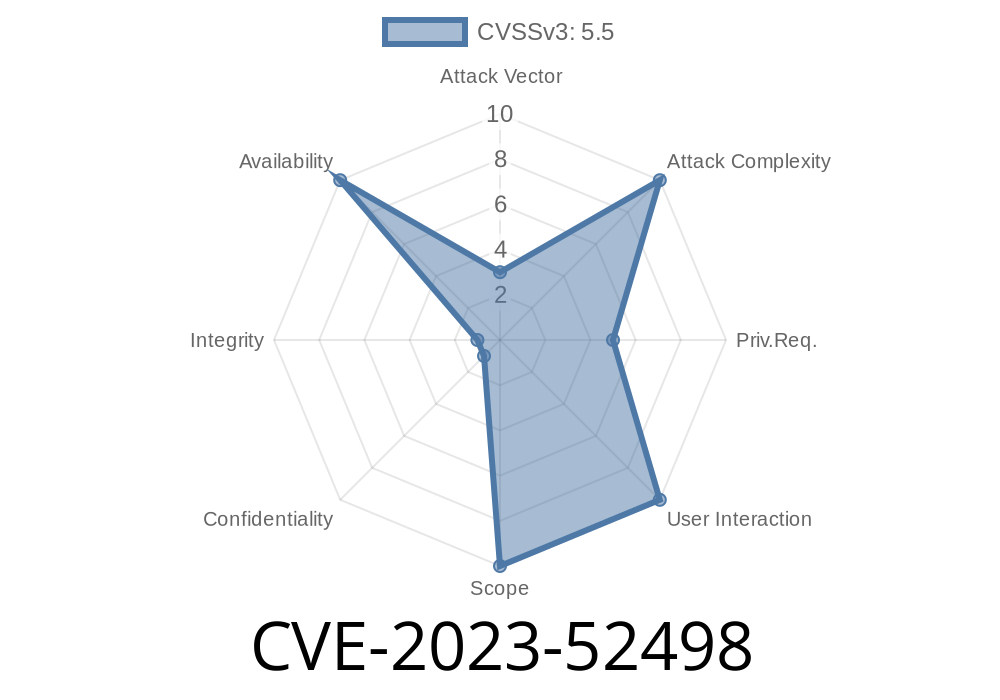The Linux kernel runs everything from supercomputers to your phone. Like all complex software, it's not immune to bugs—a recent critical one is CVE-2023-52498, which could freeze your whole system during low-memory events. In this post, we'll break down what went wrong, how it was fixed, show some relevant code, link to references, and explain how the flaw could be exploited and why it mattered.
Background: What Actually Failed
The Linux kernel manages device power using a framework called Power Management (PM). When your computer "sleeps" and "wakes up" (aka *suspend* and *resume*), thousands of devices must pause and later restart in the right order.
To speed this up, Linux can "resume" devices asynchronously (in parallel) using async_schedule_dev(fn, dev). But sometimes—like when the system is really low on memory—this function can't allocate the resources needed, and as a fallback, instead of failing, it runs the callback right away, synchronously.
Why is this a problem? Suppose your driver resume function expects to run later, not during the current lock context; if it tries to re-acquire a lock that's already taken, the whole resume process deadlocks. The bug happens especially when locks are nested or shared across devices.
Real-World Scenario
Imagine a laptop stuck forever while waking from sleep. That's not just inconvenient, it's data loss risk and a possible method for local resource denial-of-service attacks (DoS), especially if you can trigger low-memory conditions through normal or abusive use.
Here’s a simplified version of the problematic code
// Before the patch
int dpm_async_fn(void *data) {
// ...
async_schedule_dev(resume_fn, dev); // May run resume_fn() synchronously!
// ...
}
// Elsewhere, the same lock is held...
mutex_lock(&pm_mutex);
dpm_async_fn(device);
mutex_unlock(&pm_mutex);
If resume_fn() tries to lock pm_mutex again inside its execution (directly or via another call), and it's running *synchronously* (not really asynchronous!), boom—deadlock.
The Fix
Instead of async_schedule_dev(), the kernel now uses async_schedule_dev_nocall(). This low-level variant never runs the callback synchronously: if it can’t queue the function asynchronously, it just returns false so the caller decides if and how to run the function.
Patch Example (What Was Changed)
/* Old, buggy usage */
async_schedule_dev(callback, device);
/* Fixed version */
if (!async_schedule_dev_nocall(callback, device)) {
/* Could not queue asynchronously, so call directly, but safely */
callback(device);
}
By controlling exactly *when* and *where* device callbacks happen, the kernel avoids running them under hazardous lock conditions, thus preventing deadlocks.
For more details, see the upstream fix patch and discussion thread.
How to (Hypothetically) Exploit This
While CVE-2023-52498 is not an "exploit" in the regular remote code execution sense, a savvy local attacker (or even a disruptive application) could intentionally fill up memory, force the system into *suspend*, and guarantee the bad path is taken. Once hit, the system fails to resume—effectively making a local DoS possible until a hard reset.
If affected device drivers use mutexes in the wrong order, system hangs.
The actual "exploit" here is reliably triggering the deadlock to deny service.
Upgrade your kernel! All major distros have backported the fix.
- If you cannot update, avoid running with dangerously low free memory when using *suspend/resume*.
- Monitor for kernel updates here or via your distro security mailing lists.
Further Reading
- Original Linux Kernel Commit
- CVE-2023-52498 Mitre Entry
- LKML Patch Thread Discussion
- Linux Power Management Documentation
TL;DR
CVE-2023-52498: In low-memory situations, your Linux system could *deadlock and freeze during resume*— because management code accidentally ran functions synchronously, causing lockups. Upgrade your kernel to stay safe!
Stay tuned for more kernel security deep-dives. If you found this helpful, share it!
Timeline
Published on: 03/11/2024 18:15:17 UTC
Last modified on: 12/12/2024 17:32:20 UTC
